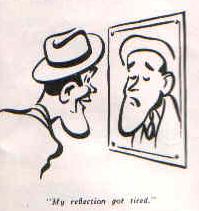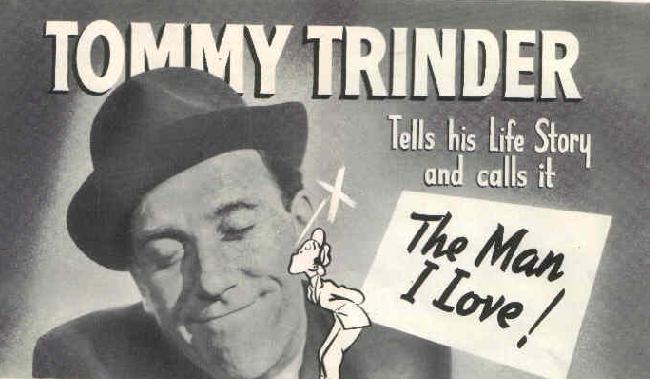|
This text is taken from a pamphlet entitled "The Tommy Trinder Story".
It is dated from around 1950 and was available in the theatre foyers during a tour of Australia. It appears to have been writen by the man himself, and its just real pity it is so short.
|
 |
CHAPTER ONE
(I call this chapter The Begining of the End. I got this title when I overheard a couple of show girls talking. "Trinder - Who's Trinder?" "Don't you know him? My dear, he's the END!")
A year before I was born, my father and mother came to london from Oxford. They were fugitives from the accent. In Oxford my father worked in a bakers shop, but he longed for adventure, for travel, for the great outdoors. So in London he became a tram-driver.
When I was born he took one look at me and said to my mother: " If thats what fresh air's done for me, I'm going back to baking"- and he did. His disapointment in me- do I have to tell you?- was temporary.
He had always longed to have a horse. Another thing he said to my mother when they first inspected me was: " I wanted a horse. THAT isn't a horse." My mother looked at me closely. " No more it isn't," she said.
When I was about twelve I had a voice like Deanna Dirbin's only more feminine. And was as stage-struck then as I am now.
I entered a competition held at Collin's Music Hall, Islington, London-my first stage appearance. The Dorothy Mullard Repertory Company
were doing a show called "Two Little Drummer Boys."
As the competition was put in between Acts Three and Four, the show must have been a riot. The competitors couldn't have been too hot, either, because I won the competition- and with a job in "Casey's Court." This was the show that discovered Charlie Chaplin- and I've heard he hasn't done badley either.
In " Casey's Court" I appeared dressed in rags and tatters, sitting in a poverty stricken house- the kind you can pick up today for five thousand nicker, plus a war damage claim. I sang a song, the words of which I still remember.
And why not! I still use gags I put in my first comedy routine. The song went like this:
"What is a Mammy, Daddy?
(This was before Al Jolson told the world)
Everyone's got one but me,
Is she the lady that lives next door?
Who cooks your dinner-sweeps up the floor?
I've got no Mammy to put me to bed,
No Mammy to send me to play,
But I promise I'll be such a very good boy
If you bring me a Mammy some day."
It brought tears to the eyes of the audience, I was on the road to success. But fate was to intervene-fate in the shape of Old Father Time.
EYES SHUT, BUT MY EARS TOLD ME
An enormous crack appeared in my voice, I tried to shut my eyes to it, but my ears kept telling me. Then the audience began telling me. From that time my days at Deanna Durbin were numbered.
Finally, my voice broke, with a sickening thud, and then the management told me. They said I was too old to cling to my career-I must give way to youth. I was fired.
I wasn't bitter. I realised that Wee George Wood was equally entitled to make a living. I walked out of the theatre, and, as I thought, out of show business, bravely hiding my tears and my weeks money.....
Blowing my savings on an evening paper, I read it on a lurching tram.
The death of an american millionaire was reported, and the paper said he started his career as a butcher's boy. The very next morning I went to Smithfield and joined a firm of butchers as a sort of junior partner. Well my job was to run errands and clean windows.
But the glamour of the footlights called me-that and the fact it was the highest paid work in the world. for instance, I learned that Working Mens Clubs paid no less a nightly fee than 7/6 for three songs, plus eighteen pence for an encore.
I had no agent in those days, so this money - after deduction of surtax and supertax - was net. I went as often as I could to these Working Mens Clubs. Because of the uncertainty of my voice, I was forced to fall back on a comedy routine, but on the days when, by sheer concentration and hard work, I could keep my voice on an even keel, I prefered to sing. The money was better.
This was how the racket worked in those far-off days. Knowing you had three songs to sing, you started of with the worst repetoire (and that was no easy choice, as all three were usually horrible) and worked your way up to the least offensive.
Then by employing certain ventriloquial talents such as making your own whistling sounds as though it came from the body of the hall, you forced an encore. In between taking "calls" you would try to raise the ante on the encore in the wings - bumping it up, if you were lucky, from eighteen pence to two bob.
By doing this three times an evening, traveling in your make-up in crowded trams between the Tottenham Liberal and Radical Club, The Enterprise Club, Tottenham, and the Tottenham Trades Club, you were in the money. All that was needed was a thirst for travel, a string constitution and an ability to do without sleep.
Unfortunately I did not acquire the last qualification until many years later when I became a night club entertainer in the West End of London and on Broadway, New York. Butcher shops open early , and it wasn't long before the cry, "Where's that blankety Tommy?" used to ring out over Smithfield.
THE BUTCHER CUT UP ROUGH
One morning my bosses noticed that for a week I had been arriving when they were having their elevenses. They started to critsise my work.
"Look at those windows" one of them said. "Go and clean them at once!"
"What!" I said, "and show the public what you are selling?"
The next morning I was looking for a job. Tramping the streets and mediating on my last exchange of courtesies in the butcher's shop, I decded that the only people you can be rude to and not be thanked for it are theatre audiences. And there and then I made up my mind that my life lay in show business.
And that was the begining of the end!
CHAPTER TWO
(I'll tell you how I "rose" from Mansion House to log cabin. This title was inspired by Abraham Lincoln. Bob Hope is another American who gets a lot of material from me.)
|
 |
The first real milestone of my career as a comedian was when I was booked to appear in Middlesbrough. For days I rehearsed my ad lib comedy gags in front of the mirror, and the audience reaction was terrific. Every now and then I had to stop to give my reflection a rest.
My mother took me to the station to see me off. She had a label tied to my neck saying THIS SIDE UP-WITH CARE, and put me in the charge of a kindly old lady. That was how I first came to meet Arthur Lucan.
I kissed the porter goodbye, gave my mother a tip, and carried myself into a luggage van.
My touring days had begun.
|
My mother is a very superstitious woman and, before we left Trinder Towers she gave me something Old, Something New, Something Borrowed and Something Blue.
"You can't be a comedian," she told me, "unless you take these." I gave Something New back to her. "I can get along on the other three," I said, "all the other comics have."
By the time I got to Middlesbrough I only had Something Blue left so after three days back in the theatre I was paid off and told never to come back.
In three weeks I was back in the same theatre with a new routine (Something Borrowed) and with my face blacked. This gave Eddie Cantor an idea he's never really recovered from.
Ah the delights of success! From this point on, I knew I could command my own terms.
A booking manager of a traveling revue company wired me asking what these were. After borrowing the money for a telegram, I wired back confidently: FIFTEEN POUNDS A WEEK.
How could he resist it? Sure enough, he wired back: O.K, TAKE FIFTEEN POUNDS FOR TWO WEEKS. I joined the show and after my first week received seven pounds ten.
"Here," I said "Whats this?" The booking manager looked at me as though I'd bitten his hand that was feeding me.
"Fifteen pounds for two weeks," he said patiently, "thats seven ten a week, ain't it?"
However, I stayed on with the company. "Whats money," I consoled myself, "to a creative artist?"
|


